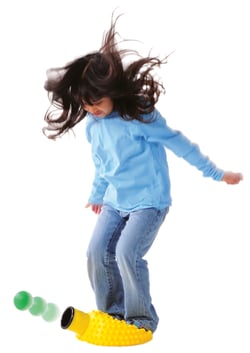What is Cause and Effect Play?
Few adults who care for young children do not enjoy getting drawn into the delightful hilarity that cause and effect play tends to bring about. Cause and effect play often happens spontaneously when a young child discovers that some action that they initiate has a certain effect, often surprising or funny. Every time the little one drops that spoon on the floor and the big person picks it up, every time they shake a rattle or punch a button and the result is a sound or mechanical action, every time they pinch Granddad’s nose and he snorts playfully - the child learns that they can expect their actions to bring about certain reactions.
How do young children benefit by cause and effect play?
Young children’s natural curiosity is satisfied when they discover what effect a certain action is likely to have. Cause and effect play can support learning in many ways. Infants and very young children learn to predict certain outcomes and feel a sense of control over their environment - an important experience for a little one whose life is virtually completely organised and run by the adults around them. 
Engaging in often seemingly endless repetition gives young children the opportunity to practise new skills such as language, gross and fine motor skills, coordination and speed. Just like practising eating with a spoon, learning a new song or riding a bike, the repetitive actions in cause and effect play form and strengthen new connections in the brain, and support growth in many areas of development.
Cause and effect play also benefits children’s emotional development, both through the enjoyment of the activity and often also through bonding with an adult, older child or friend who may be taking part in the fun. Everyone agrees that laughter has a positive effect on our physical and mental health; and sharing young children’s delight at the surprise factor in cause and effect games helps strengthen positive and trusting relationships.
How can I provide quality cause and effect play experiences?
While cause and effect play happens all the time - our little scientists are forever busy working out new ways of looking at the world; experimenting, discovering and inventing as they go - there are ways that we can add value to young children’s learning through providing just the right resource to suit the interests and development stages of the children in your care. Play’n’Learn has an exciting range of toys and equipment to help you do just that. Here are a few ideas to get you going.
Cause and effect play can be very general and includes many daily actions but deliberate and repetitive play of this kind plays an invaluable role in child development. Encouraging and supporting it has many developmental benefits.



